Although our physical archives in Piper Hall remain closed due to Illinois’s shelter-at-home order, there is still plenty of work to be done. The week before the issue was ordered, the Women and Leadership Archives began preparations to work remotely. Graduate Assistants working on digitization projects began mass scanning the Mundelein College Photo Collection to create work for them to do remotely. The Director and Assistant Archivist began meeting to discuss what projects could be available for the Assistants. They also contacted researchers to try and find a way to make collections accessible during the closure. And so many more things happened in that week.
What about now?
The Mundelein College Photo Collection digitization project has kept the Graduate Assistants busy along with creating social media posts like this one.
The Graduate Assistants have focused mainly on the creation of metadata to continue the Mundelein College Photo Collection digitization project. Metadata provides the background information of a photo. We fill in the following fields of information: Identifier, title, date, description, transcription, extent, medium, place, subjects, creator, digital collection title, physical collection title, type, repository, rights, and rights statement. Once a Graduate Assistant has filled out the fields on a batch (typically around 200 images), another student reads through all the information to check if everything makes sense. After any changes are made and discussed, it goes to the Assistant Archivist for review all before being published on Preservica for the public to view. All the photos we have worked on so far will eventually find their way here: https://luc.access.preservica.com/uncategorized/SO_ebd3a77d-82f4-4559-a9ac-60f625318a2b/.
The Sesquicentennial Scholars were able to use items already gathered for their research for an upcoming online exhibit that they can work on from home. More information on the Sesquicentennial Scholars can be found here: https://www.luc.edu/wla/sesquicentennial/
What has it been like?
I cannot speak for everyone at the WLA, but I can speak about my own experiences.
We have kept to our same work schedules, working the same hours on the same days. We added weekly meetings to check in with everyone. We created a chat system to still have a sense of normalcy with watercooler banter. But a lot changed. Side conversations prove more difficult when the person is not just a desk away. We could no longer share food for meetings and parties.
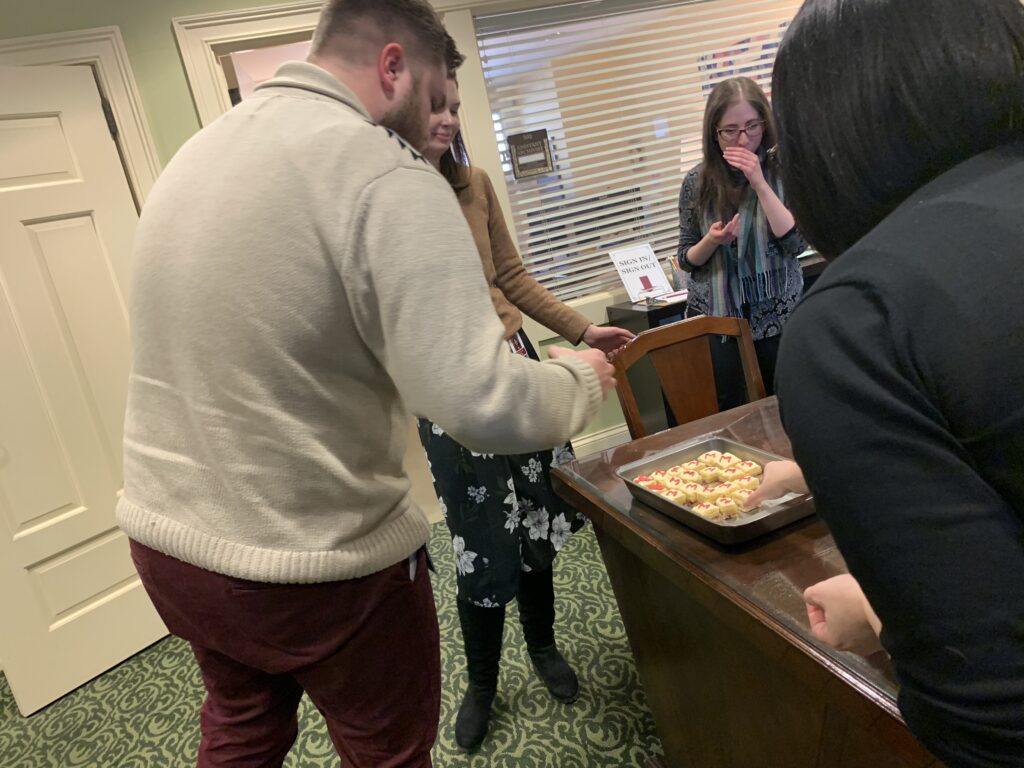
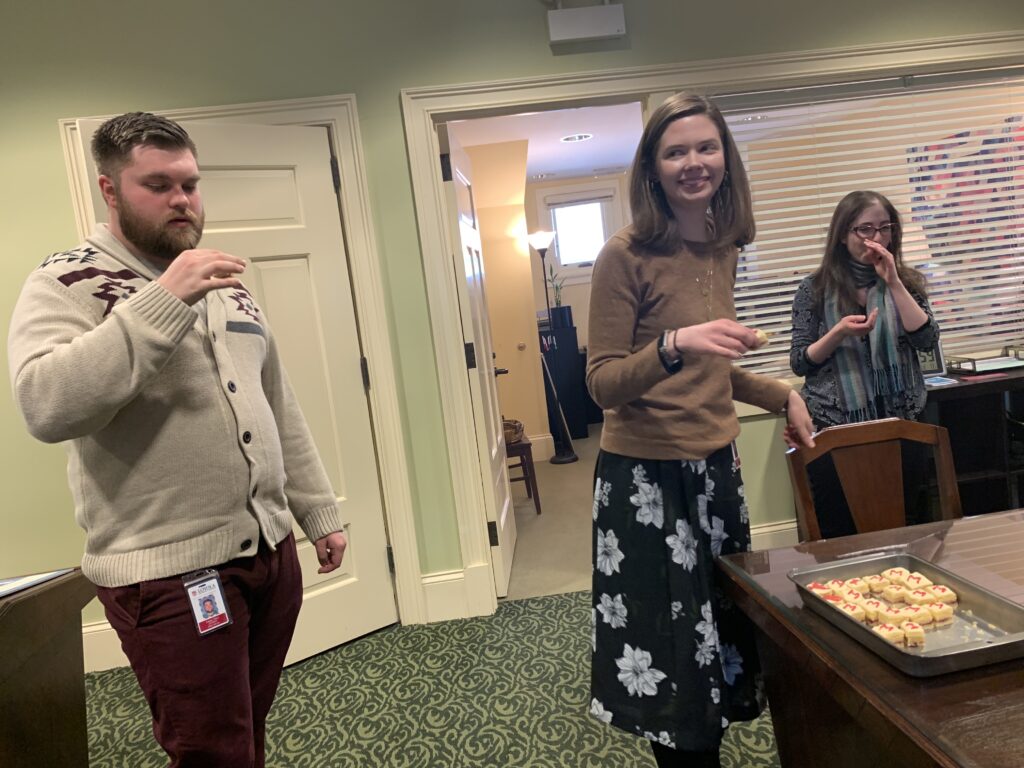
I ended up getting a new desk space set-up in my apartment to attempt and keep a work-life balance. This new setup allowed me to convert a TV into a second monitor. This made it a lot easier when creating metadata for the digitization project.
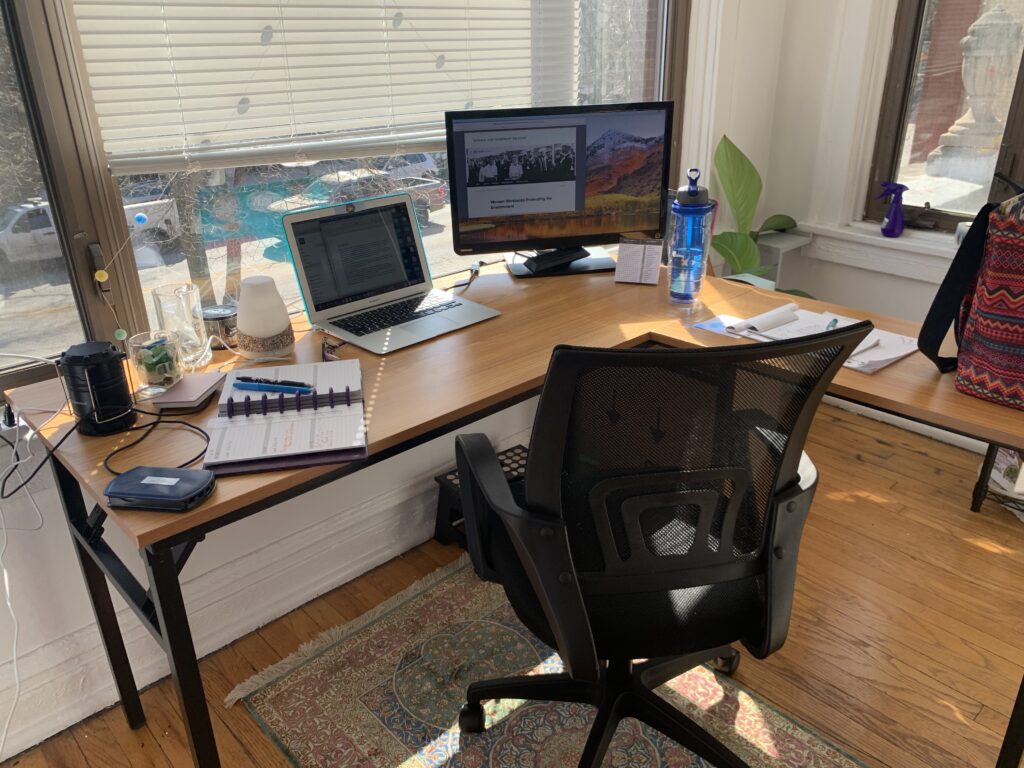
Together, the staff eased the tensions of the transition by adding weekly meetings and a chat platform for communication. The weekly meetings allowed workers to talk about the changes and update each other on their on-going projects. Here we learned that efforts to help researchers and contact donors was not completely limited. Reference inquiries sent to wlarchives@luc.edu are still being accepted and answered as best as we can. The chat platform allowed a mix of communication from watercooler chat to workplace discussions. Comradery among colleagues builds morale, and that was needed during this time. Watercooler chat consisted of cat pictures, memes, and food recipes. Workplace chat allowed a more open dialogue than email provided when trying to discuss changes or general questions workers faced, such as “which building do you think this is?”
What do you miss?
One thing I really miss is working directly with collections. Not only did it provide a break to the tedious creation of metadata, but many historians agree there is something special about holding an original document, even if it is with gloves to protect it. However, not working with collections meant I had some positives. I had control over temperature for comfort and not preservation. I could have food, coffee, and other drinks at my desk. I sat near windows that let in a lot of light. And I could use a pen without worrying about accidentally marking a document.
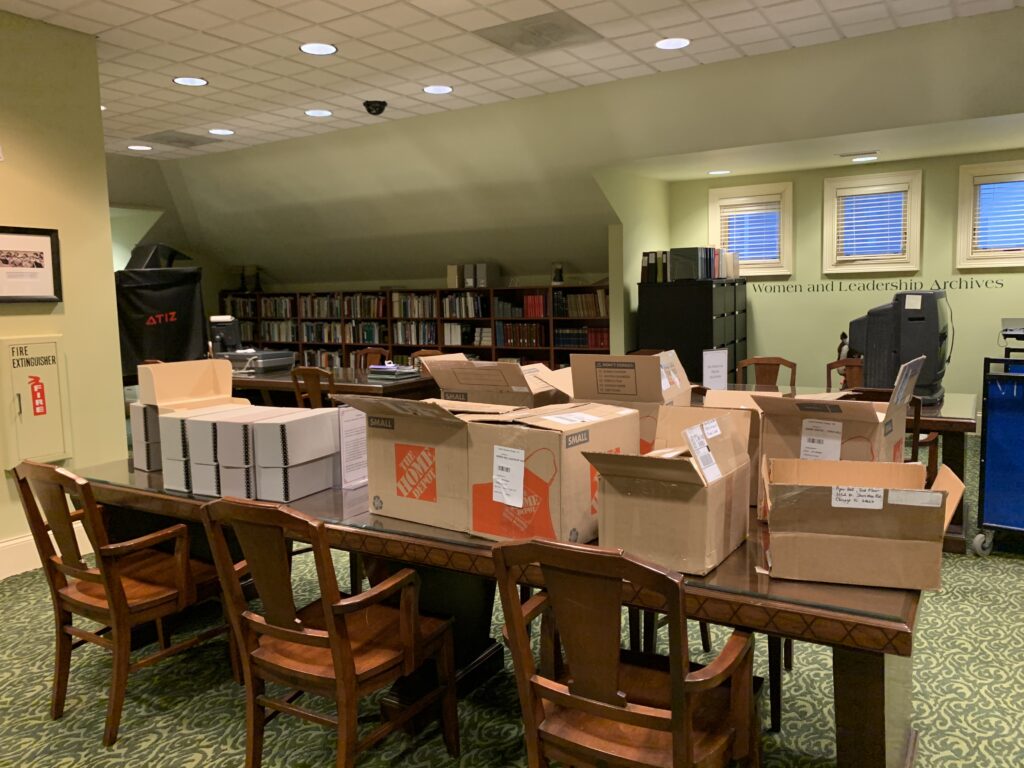
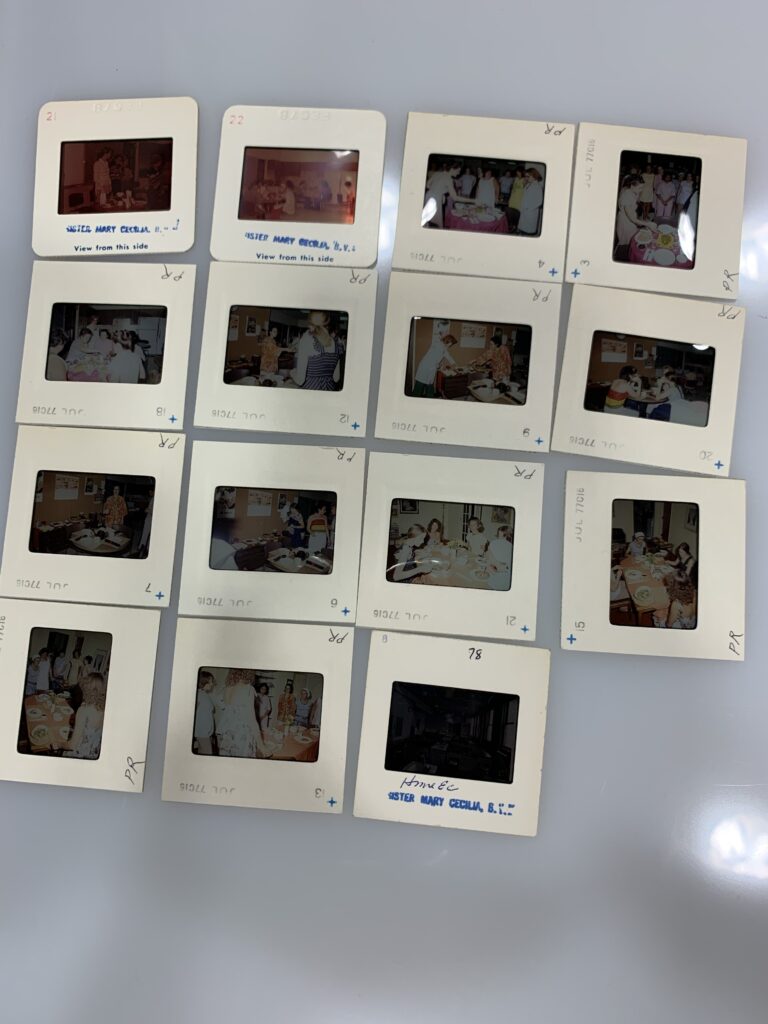
However, the thing I missed most has been creating outreach programs and events. Right before shelter-at-home, Loyola University had canceled all large gatherings not essential for classes. Myself with the other Graduate Assistants had been preparing a pop-up library with exhibits to highlight women in science. We had pulled Mundelein’s old science equipment, made write-ups about the scientists in our collection, and had carefully suggested books available for checkout. This event was canceled, and honestly, I was heartbroken. The Director and Assistant Archivist assured us the materials would be used in the future when these types of events could happen again. But not being able to open our doors and be accessible for researchers and the public has had the biggest impact on me. One of the main functions, purposes, and goals of archives is equitable access. There is so much the past can offer to the present. Not being able to share that can make you feel useless.
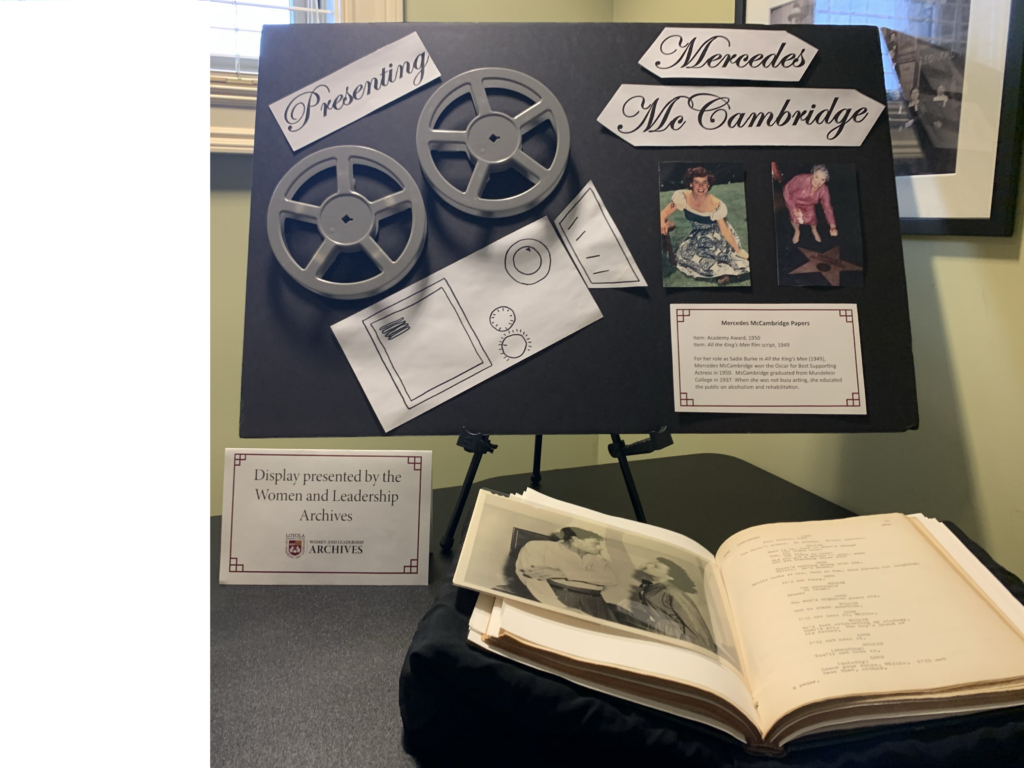
What does the future look like?
Piper Hall and the Women and Leadership Archives will not be closed forever. Our doors will reopen with the staff excited to be accessible for researchers. We will have events to share our collections and present information drawn from our collections. We use this viewpoint to bring comfort, peace, and hope as we struggle to find a purpose during shelter-at-home. We cannot wait to see everyone again face to face, but for now, we will wait. We will do what we can to make the best of this situation. Until then, we’ll continue to share our work and collections online. We look forward to continuing to engage with you in this way during these uncertain times.
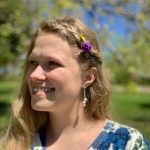
Miranda is a Graduate Assistant for the Women and Leadership Archives. She has her undergraduate degree in History and Dance from Anderson University Anderson, Indiana, and she is currently pursuing her master’s in Public History from Loyola University.
Loyola University Chicago’s Women and Leadership Archives Blog is designed to provide a positive environment for the Loyola community to discuss important issues and ideas. Differences of opinion are encouraged. We invite comments in response to posts and ask that you write in a civil and respectful manner. All comments will be screened for tone and content and must include the first and last name of the author and a valid email address. The appearance of comments on the blog does not imply the University’s endorsement or acceptance of views expressed.
